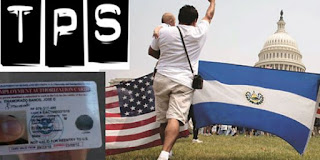Temporary Protected Status -- will US really expel 300,000 law-abiding residents?
A recent report from the Center for American Progress emphasized the economic and family ties which these immigrants have with their communities in the US:
They have lived in the United States for an average of 19 years and are employed at high rates, ranging from 69.2 to 83.5 percent. The contributions made by TPS holders, moreover, will only continue to grow in the future, as they are collectively raising families that include nearly 275,000 U.S.-born children....
TPS holders are long-term, integrated members of communities across the United States. On average, recipients from Honduras have lived in the United States for 22 years, recipients from El Salvador an average of 21 years, and recipients from Haiti an average of 13 years. Nearly one-third of households with Salvadoran, Honduran, and Haitian TPS holders have mortgages. This measure is indicative of TPS holders’ active pursuit of homeownership, which brings along with it important contributions to their local economies in the form of sales and property taxes. Ending TPS, and thereby removing the ability of recipients to work legally, would likely increase the risk of foreclosure for families with TPS members. And given the spatial concentration of TPS holders, eliminating TPS could have negative economic reverberations for entire communities.
TPS holders’ roots extend beyond themselves to their families. Salvadoran, Honduran, and Haitian TPS holders have a total of 273,200 U.S.-born citizen children. If TPS is eliminated, these U.S.-citizen children would also face serious risks: They would either face separation from their parents or be forced to relocate to a country foreign to them. Even the fear of family separation or deportation of parents has been found to have detrimental effects on children’s cognitive and psychological well-being.A decision could come within the next two weeks, as a decision for Honduran TPS holders must be made by the administration by November 6, 2017. There is a significant likelihood that a decision for Honduras would be linked to a parallel decision for El Salvador. Thus advocates for TPS holders are currently making an all out push to preserve the program at a minimum.
This video produced by TPS advocates puts a human face on the issue.

Comments